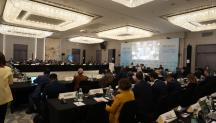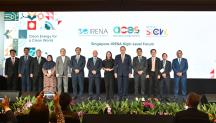.jpg?w=204&h=107&as=1&bc=ffffff&cc=1&hash=BA2F9FE825D780F7E7F45C2C1AAC7CE4)
.jpg?w=201&h=105&as=1&bc=ffffff&cc=1&hash=6432B7003A366FF1C5D2E8A6548DB430)
Latin America: New recipe for renewable energy results
Newsletter
The Latin America region possesses vast renewable energy potential in the form of geothermal, wind, solar, hydropower and biomass. To date, the region has primarily served up hydropower and biomass, leaving other renewable sources mostly untapped. Now, concerned with increasing energy demand and the impacts of climate change, regional leaders are looking to diversify their energy mixes and develop their economies in a sustainable manner.
Last month, this shared objective brought together high-level representatives from 12 Latin American states in an executive strategy meeting with IRENA, OLADE, IGA and SICA, on the sidelines of IRENA’s fifth Assembly. All participants acknowledged the importance of taking urgent action in this field, with Fernando Ferreira, Executive Secretary of OLADE, stressing that “In Latin America, energy is a matter of social inclusion. It is not an issue for the future, but one we must address now.”
The urgency of this matter is heightened by increasing concerns over climate change, regarding both the impact the energy system has on the environment and the impact of the environment on the energy system. This is where Latin America’s heavy reliance on biomass and hydropower poses a threat.
With changes in rainfall affecting hydroelectric power generation, energy planners are seeking back-up technologies, but are faced with a lack of data on the potential of other technologies. In certain nations this knowledge gap has also created financial barriers, as noted by Irene Cañas, the Costa Rican Vice Minister for Energy. Ms. Cañas highlighted the difficulty in building wind farms, given that banks require three years of data in order to fund them. Furthermore, a number of nations expressed their concerns over falling investments due to falling oil prices.
Concerns however, were muted by Mr. Ferreira’s determination that many advancements have been made in the region and that short-term challenges cannot deter the progress towards a sustainable energy future. He stated “It is our job to show politicians and investors that these are temporary issues, and they cannot – must not – deter renewable energy deployment.”
During the event, IRENA highlighted the results of the REmap report, which finds that it is both economically, technically and socially feasible to increase renewable energy in Latin America 240% by 2030. IRENA underscored the progress made in data collection, through Renewable Readiness Assessments, and promised to support nations in building a business case and the necessary regulatory framework to accelerate deployment.
This may well open the doors for Latin American leaders concerned with energy security, local development and climate change mitigation, to take their existing ingredients and work in collaboration with IRENA and their regional partners to cook up a sustainable future for themselves.
Following the conclusion of the fifth Assembly of IRENA, Heads of Delegation of Latin American countries issued a joint communique calling for cooperation to accelerate renewable energy development to support rapid regional social and economic growth.




